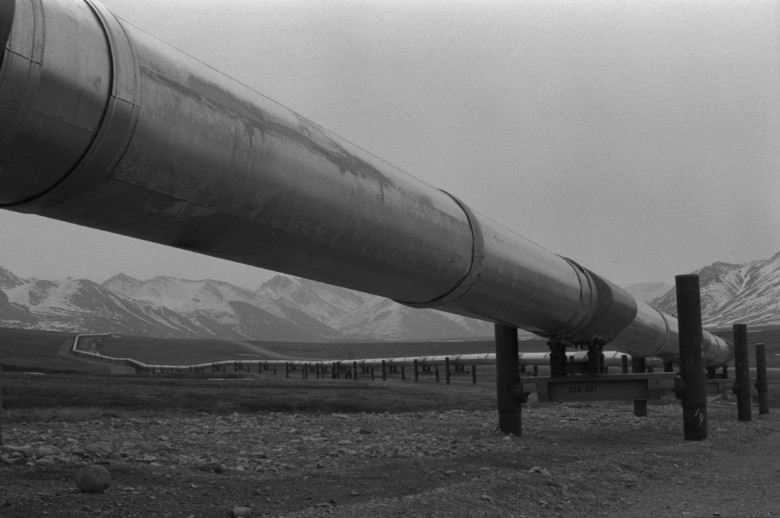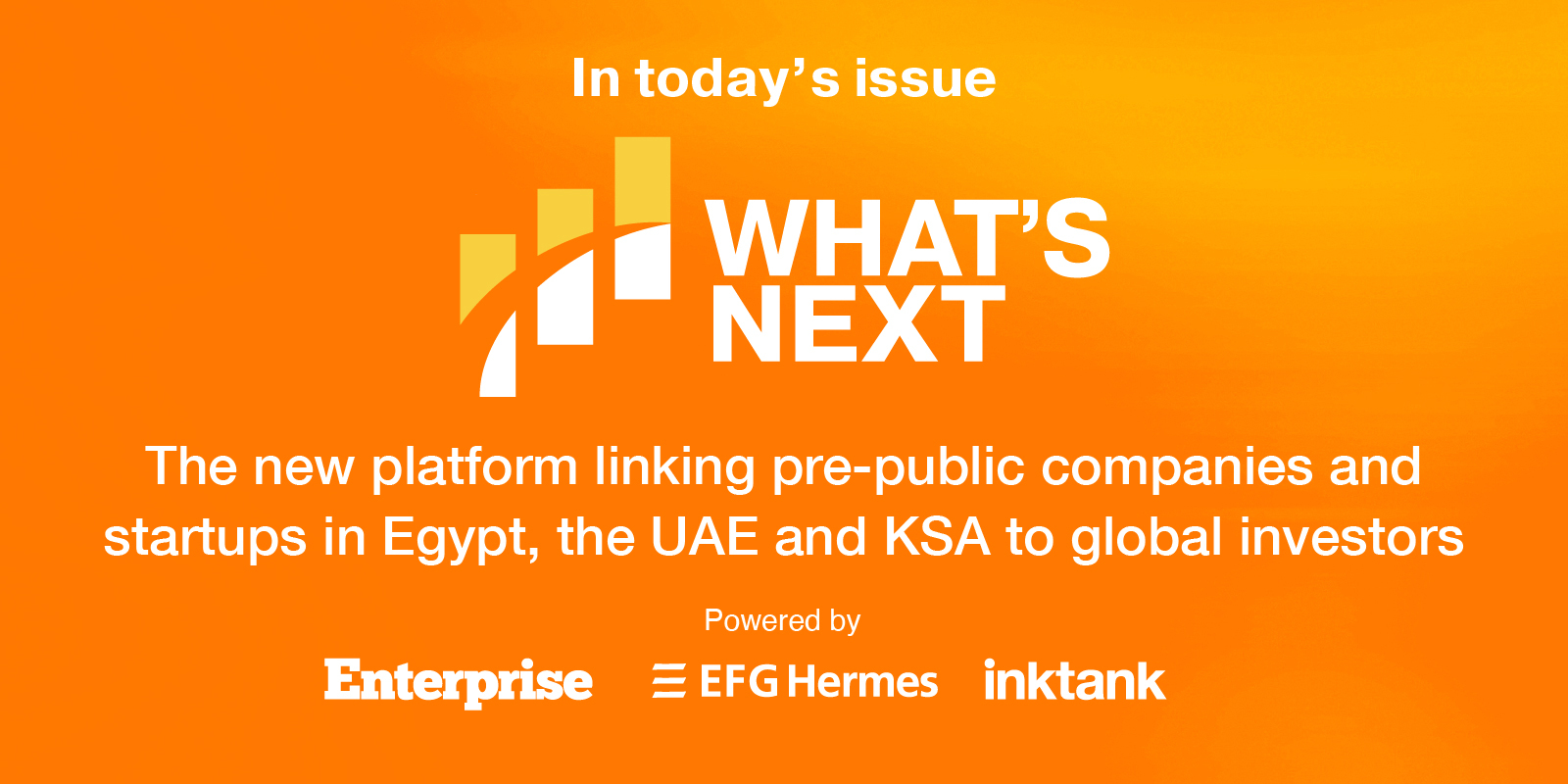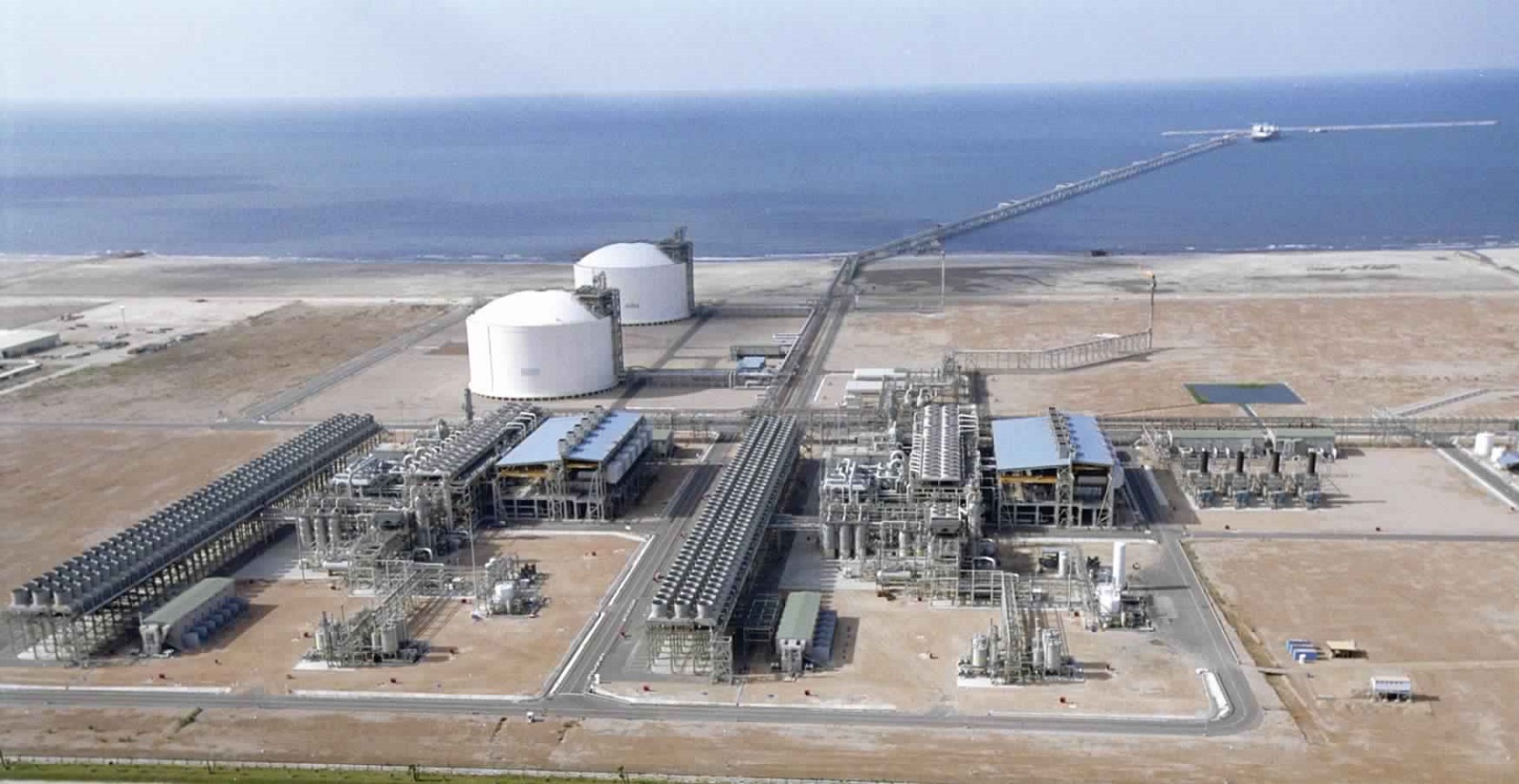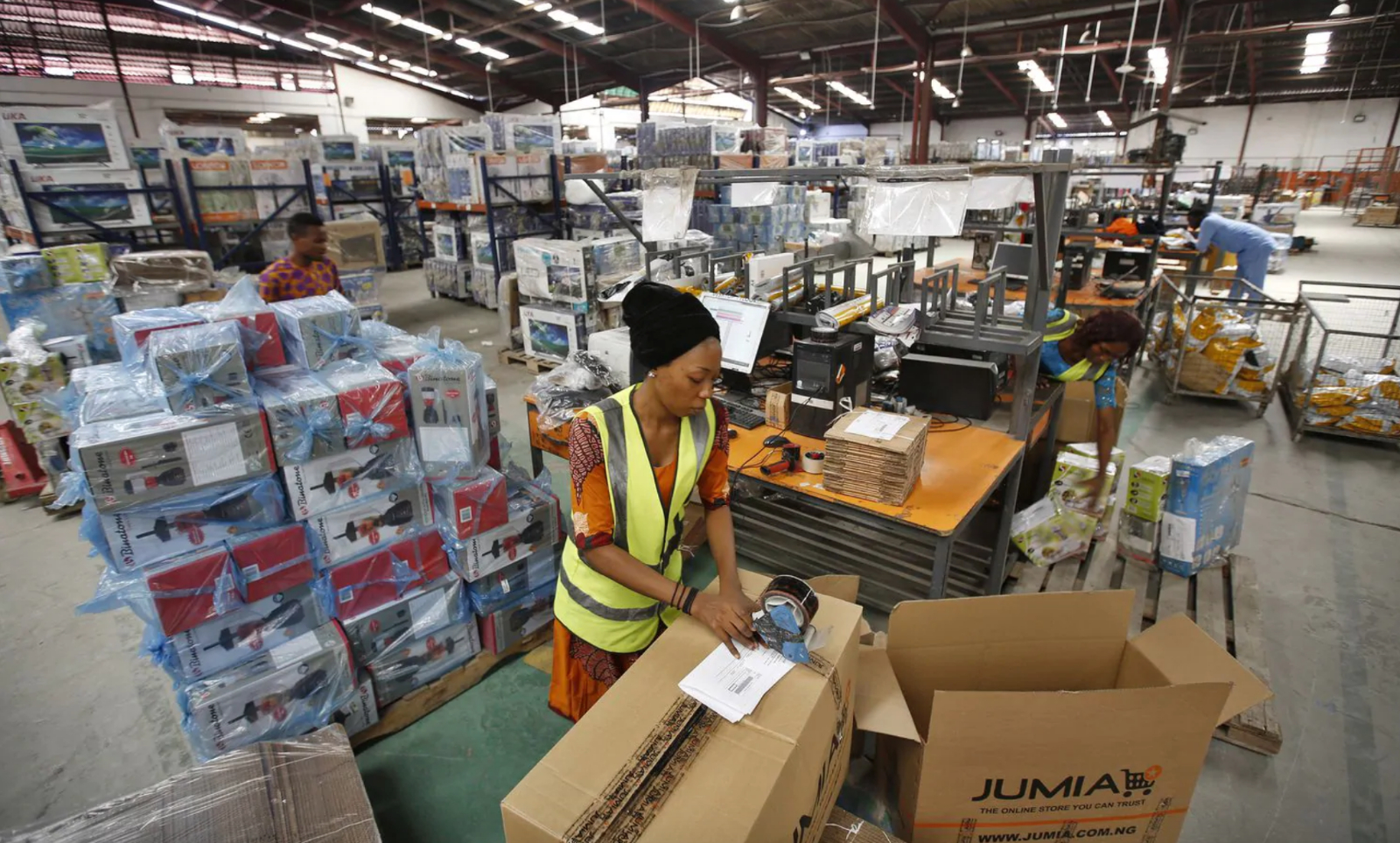- Egypt’s LNG exports are maxed out + Italy’s Snam steps into the EastMed. (Energy)
- Omicron’s world tour will likely put a damper on global growth outlook -IMF’s Georgieva. (What We’re Tracking Today)
- Markets had a wild week — but there’s some good news in there for Egypt. (What We’re Tracking Today)
- Gas cylinders just got a little pricier. (Energy)
- Operation Replace Dongfeng continues this week. (Automotive)
- Booster shot registration is opening in the next few days. (Covid Watch)
- Jumia taps into Egypt’s e-payment market. (Fintech)
- How family businesses can weather the post-covid era. (What’s Next)
- Planet Finance — It already looks like 2022 won’t be kind to EMs.

Sunday, 5 December 2021
AM — We’re maxing out LNG exports.
Plus: Fintech just got a bit more crowded as Jumia moves in
TL;DR
WHAT WE’RE TRACKING TODAY
Good morning, wonderful people, and welcome to the first full week of December.
Before we get underway, we offer our fellow grammar and typography nerds this break from the hurly-burly of year-end newsflow: Go watch Alexis Gay’s homage to the em-dash (runtime: 1:00). Use it wisely, young Skywalker.
THE BIG STORIES ABROAD-
Omicron has now landed in as many as 46 countries, according to a New York Times tracker, up from 38 on Friday. Chile became the latest country to report a confirmed Omicron case in a fully-vaccinated resident who recently traveled to Ghana, Bloomberg reports.
Early data shows that this strain is more contagious than the delta variant, but delta remains more dominant globally, Maria Van Kerkhove, the WHO’s covid-19 technical lead said, according to CNBC.
Omicron could have some of the genetic material from the virus that causes the common cold in humans, which might be the reason it is more infectious than other covid-19 variants, a study from biomedical data analytics company Nference suggests. The study, which has yet to be peer-reviewed, also suggests that the strain could be less virulent than other variants.
Oh, and get this: Natural immunity isn’t fantastically protective against Omicron, with a preprint paper out of South Africa suggesting that “reinfection is around three times more likely with Omicron than it was with other variants,” Axios reports.
The most obvious feature of Omicron so far is how little we know for certain about the strain, Angelica Kutzi, the South African doctor who first detected the new strain, told Kelma Akhira’s Lamees El Hadidi last night. It appears that individuals infected with the variant do not suffer from loss of taste or smell — and that the most commonly reported symptom is mild fatigue. Vaccinated individuals also report much milder symptoms than those who have not been vaccinated and no deaths have been reported thus far as a result of infection from the variant, Kutzi said (watch, runtime: 16:02).
The IMF is likely to react to Omicron by downgrading its growth forecast for the global economy, fund chief Kristalina Georgieva said on Friday, Reuters reports. The lender said in October that it expects the global economy to grow by 5.9% in 2021 and 4.9% next year, but the new covid variant has forced new travel restrictions and inflamed turbulence in the financial markets. That could force the IMF to revise figures downwards when it updates its outlook in January. “A new variant that may spread very rapidly can dent confidence, and in that sense, we are likely to see some downgrades of our October projections for global growth,” said Georgieva.
WHAT’S HAPPENING TODAY-
It’s PMI day: Purchasing managers’ index figures for November for Egypt, Saudi Arabia, and Qatar will be released this morning. Figures for the UAE, which normally come out on the same day as Egypt and Saudi, will be released this coming Tuesday, 7 December. You’ll find the PMI here when it’s out — or go meet David Owen, the guy who builds the PMI, who was our My Morning Routine feature this past Thursday.
THIS WEEK-
Aldar / ADQ MTO subscription window wraps up this week: SODIC shareholders have three more days to respond to the mandatory tender offer submitted by the UAE’s Aldar Properties and Abu Dhabi sovereign wealth fund ADQ. The Financial Regulatory Authority set the deadline for Tuesday, 7 December.
The Central Bank of Egypt will issue USD 1 bn of one-year USD-denominated treasury bills on Monday, it said Thursday. The auction will conclude on Tuesday. Egypt has sold some USD 5.1 bn of USD-denominated debt so far in 2021 across five issuances.
|
MARKET WATCH-
Another volatile trading session on Friday capped a wild week in the markets as a poor US jobs report added to the turbulence caused by the resurgence of covid-19 and increasing hawkishness at the Federal Reserve. US tech stocks were particularly hard hit as sell-offs in Tesla, Facebook / Meta (now technically in a bear market after sliding 20% from its recent peak) and Adobe stock dragged the Nasdaq down almost 2% by the close of play. The Dow and the S&P 500 also saw red, with large intraday swings pushing the volatility index (VIX) to its highest level since the Gamestop short squeeze in January. Bloomberg and the FT have more.
Crypto, meanwhile, fell to fresh lows yesterday. You can thank Omicron and jitters about inflation. Bloomberg, Reuters, and the Wall Street Journal all have the story.
Volatility isn’t all bad news for policymakers in Egypt, though:
#1- The price of oil is now down almost 20% from its peak in late October: Oil — the single-biggest item on Egypt’s import bill — remained close to its recent three-month low on Friday and Brent fell as much as 5.7% on Thursday. The fall came as OPEC+ announcing on Thursday that, while it will go ahead with plans to add another 400k bbl/d to the market in January, the group will “make immediate adjustments if required” should the spread of Omicron cause demand to weaken.
#2- Wheat prices are finally falling back after soaring to record highs last month: Wheat futures had their worst week in three months, falling 4% last week due to concerns about Omicron’s impact on the global economy. The market is still being supported by flooding in Australia — the world's sixth-largest wheat producer — and significant demand, Bloomberg says. Egypt was a big buyer last week, taking advantage of the drop in prices by ordering 600k tonnes in what was the country’s biggest tender in years.
CIRCLE YOUR CALENDAR-
News triggers to keep your eye on:
- Foreign reserves: November’s foreign reserves figures will be released this week.
- Inflation: Inflation figures for November will be released this Thursday, 9 December. Data for inflation typically appears on the 10th of every month, but is moved up one day if that falls on a Friday.
- Interest rates: The Central Bank of Egypt’s Monetary Policy Committee will hold its final meeting for the year to review interest rates on Thursday, 16 December.
Check out our full calendar on the web for a comprehensive listing of upcoming news events, national holidays and news triggers.

*** It’s What’s Next day: We have our weekly deep-dive into what makes and shapes pre-listed companies and startups in Egypt, the UAE and KSA, touching on investment trends, future sector insights and growth journeys.
In today’s issue: In our debut What’s Next column last week, we took a look at the nascent trend in Egypt that is seeing young businesses buying up other early-stage firms as part of their growth strategy. In the first part of a three-part series, today we look at privately-held companies that are further along in their journeys: family businesses.
Family-owned businesses are critical if you want to know where the next generation of great Egyptian companies is coming from, though the vast majority fail to last long after their founders pass the torch to new generations. Today is part one in a three-part series about what family-owned businesses need to do, not to be prepared for What’s Next, but to make sure that they’re still around to be ready for it.
Are you a company exec or investor and want to learn more about What’s Next, including our flagship conference? Drop us a line on whatsnext@enterprise.press.
ENERGY
Egypt’s LNG exports are maxed out

Egypt’s LNG terminals are running at full capacity as the country tries to capitalize on the surge in natural gas prices overseas, Oil Minister Tarek El Molla told Reuters on Thursday. The country is currently exporting the equivalent of around 1.6 bn cubic feet per day (bcf/d), helped by the resumption of operations at the Damietta LNG plant in February and skyrocketing gas prices in Europe. Shipments are expected to fall to 1 bcf/d next summer due to rising domestic consumption, the minister said.
“Egyptian gas has played a role in securing Europe's energy needs … The liquefaction units are now operating at full capacity as we try to maximize our natural gas exports in light of the rise in international gas prices,” El Molla told the newswire at the East Mediterranean Gas Forum ministerial meeting in Cairo.
El Molla didn’t specify by how much exports have risen, though data from S&P Global Platts in early November showed that shipments had begun to pick up in 4Q2021 following the summer lull the previous quarter. As of the second week of November, more than eight gas shipments had departed from Egypt in 4Q2021. At least 75 LNG shipments have been shipped so far in 2021 — a huge jump after having only shipped 24 during the whole of last year.
We want to export more Israeli gas next quarter: The ministry wants to increase the amount of gas it pipes in from Israel for export exports to 600-650 mn cf/d in 1Q2022, up from 450 mn cf/d currently, he said, explaining that any further increases would require an additional onshore pipeline, which could be constructed in 2024-2025. Under the existing USD 19.5 bn agreement with Israel, Egypt currently imports 2.1 bcm a year, which will increase to 6.7 bcm from 2023 through to 2034.
The ministry has plans to expand exports: Recent agreements with Greece and Cyprus have paved the way for new subsea pipelines that will allow Egypt to increase gas exports and consolidate its position as one of Europe’s most important energy hubs. A link between Cyprus' Aphrodite gas field and Egypt’s LNG facilities would allow Cypriot gas to be re-exported to Europe, while an MoU signed with Greece last month could see us ramp up shipments to the Mediterranean country and construct a pipeline linking Egypt with the Greek mainland.
Egypt became a net exporter of LNG in 2018 after the discovery of the supergiant Zohr gas field — the Mediterranean’s largest — allowed us to pull the plug on LNG imports. Gas production is currently steady, ranging between 6.5 and 7 bn cf/d, El Molla said.
A BIT OF ENERGY M&A-
Italian energy company Snam has bought Thai investor PTT Energy Resources’ 25% stake in the the East Mediterranean Gas Company for USD 50 mn. EMG is the owner of the Arish-Ashkelon gas pipeline which Israel uses to ship gas to Egypt, the company said in a statement. The stake purchase marks the company’s entrance into the region. The pipeline has a maximum capacity of 12 mn cubic meters a day.
ENERGY
Butane gas for home use rises in price nearly 8%
Gas cylinders just got a little pricier: The Oil Ministry hiked butane gas cylinder prices by 7.7%, reaching EGP 70 for household cylinders (from EGP 65) and EGP 140 (from EGP 130) for commercial consumption, Al Masry Al Youm reports, citing an unnamed source. The price hike, which came into effect yesterday, was driven largely by the surge in Brent crude prices — hitting three-year highs on the back of post-pandemic demand outstripping supply — over the past few months, according to sources from the Egyptian General Petroleum Corporation cited by Amwal Al Ghad.
Egypt imports 55% of its butane gas needs, making it more susceptible to global price fluctuations, Kelma Akhira’s Lamees El Hadidi said last night (watch, runtime: 5:59). The price increases are marginal enough that households will not feel a significant impact, but cafes and restaurants, whose prices are not regulated, could use the increase to introduce exaggerated markups, former head of the Federation of Egyptian Chambers of Commerce’s petroleum materials division Hossam Arafat said in a phone-in with El Hadidi (watch, runtime: 5:38). Ala Mas’ouleety’s Ahmed Moussa also took note of the decision (watch, runtime: 10:27).
This is the latest in a series of gas price hikes this year, but butane is still heavily subsidized: The government decided earlier this year to continue subsidizing butane gas cylinders through the current fiscal year, cutting the cost of their production by half. Natural gas prices for industries, meanwhile, rose 28% last month, and fuel prices were hiked three times this year. Under an automatic fuel pricing mechanism, the government reviews local prices of petroleum products every quarter, with the next meeting scheduled for the end of December.
AUTOMOTIVE
Operation Replace Dongfeng continues this week

State-owned El Nasr Automotive will meet with three Chinese companies this week as it looks for a new partner with whom to locally assemble electric vehicles (EVs), Public Enterprises Minister Hisham Tawfik tells Masrawy. The minister said that further details would not be provided until agreements and contracts are signed. The news comes as El Nasr is in the market for a new foreign partner to fill the Dongfeng-shaped hole in its EV assembly plans after El Nasr and the Chinese company’s talks fell through after a dispute over prices for imported components. The new EVs should be in the previously-planned price range of EGP 300-320k.
The private sector is already pushing ahead with EVs: The news comes just days after Al Mansour Automotive and General Motors said they could team up to produce EVs in Egypt with plans to present a study to the government within 2-3 months.
Meanwhile, we’re reviving plans to assemble natgas buses with Belarus’ MAZ: The Egyptian Automotive Manufacturing Company (EAMCO) and Minsk Automobile Plant (MAZ) could soon sign a contract to cooperate on locally assemble natgas-fueled buses, after Public Enterprise Minister Hisham Tawfik discussed the venture with a delegation from the Belarusian company, according to a cabinet statement. The contract, if signed, would also see MAZ providing equipment to assemble the buses, which will have a 60% local component quota. Production of the mass transport buses is expected to begin mid-next year, with an annual capacity of 250 buses. The two companies had signed an MoU to assemble natgas and diesel-fueled buses in 2019, but the venture appears to have stalled since then.
IN OTHER AUTOMOTIVE NEWS- Passenger car sales were essentially flat y-o-y in October, inching down a marginal 0.6% to 19,309 passenger vehicles during the month, down from 19,428 in October 2020, according to monthly figures from the Automotive Information Council (AMIC). AMIC data is self-reported by member distributors, who include the majority of (but not all) industry participants. Sales have been constrained by the ongoing shortage of chips, which has helped put upward pressure on prices in tandem with rising shipping costs.
Bus sales fell, but trucks did well: A total of 2,466 buses were sold during the month, falling 6.1% y-o-y but growing from September, when fewer than 2k units were sold. Truck sales were up 17.6% y-o-y in October to 4,133.
FINTECH
Jumia taps into Egypt’s e-payment market

Jumia taps into the e-payment Egyptian market: Jumia is looking to expand its e-payment footprint in Egypt with a partnership with the National Bank of Egypt (NBE) that will see it provide new third-party services to merchants outside of its JumiaPay platform, Bloomberg reports. The company, one of the continent’s largest e-commerce players, has received its e-payment license from the Central Bank of Egypt and is looking to extend its service to other online retail platforms, JumiaPay head Sami Louali told the business information service.
In the pipeline: The company said earlier this year that it will act as a payment service provider, offer payment facilitation, and provide a payment aggregator, allowing merchants to process payments off-platform. “These are significant developments for JumiaPay and allow us to deploy our payment services off-platform in Egypt, in partnership with NBE,” the company said in its 2Q earnings release (pdf).
“Opening up the platform, starting in Egypt, will enable additional monetization,” Jumia co-CEO Sacha Poignonnec said. “Ultimately this will boost our revenues.”
The rollout is currently in its pilot stage: “We have just done our first off-platform transaction,” Louali told Bloomberg. “For the next month or two we are in the pilot phase and on-boarding some merchants, after that we will be ready to scale.”
JumiaPay is having a good 2021: The number of JumiaPay transactions rose by a third to 3 mn in 3Q2021, making up almost 36% of the e-commerce platform’s orders, according to the company’s 3Q earnings presentation (pdf). Some USD 64.5 mn was sent over the app during the July-September quarter, pushing its shares of the company’s gross merchandise value to 27.1%, up from 25.4% in the equivalent period last year.
DEBT WATCH
Securitized bond market is still red-hot

Palm Hills Development closed on Thursday a four-tranche EGP 1 bn securitized bond issuance, marking the company’s seventh securitized bond since 2016, PHD said in a statement (pdf). The issuance was backed by a EGP 1.05 bn receivables portfolio. The tranches were rated AA+, AA, A+, and A-.
Advisors: Sarwa Promotion and Underwriting was lead manager and arranger on the offering, which was underwritten and co-arranged by the National Bank of Egypt, Banque Misr, Misr Capital, CIB and Ahli United Bank. Our friends at ALC Alieldean Weshahi acted as advisor.
Reminder: We still have some EGP 8 bn-worth of securitized bonds hitting the market this month: GB Lease, Corplease and GlobalCorp are issuing a combined EGP 7.9 bn in securitized bonds by mid-December, Al Mal reported, citing unnamed sources. GB Lease will make two bond issuances of EGP 2.6 bn and EGP 1.6 bn to market by mid-December, with CIB acting as primary lead manager for the issuance, the sources said. CI Capital’s Corplease is expected to issue a EGP 2.7 bn issuance by mid-month, led by Misr Capital. GlobalCorp is also on track to issue the first EGP 1.1 bn tranche of a EGP 3-3.5 bn securitized bond issuance by mid-month, according to Al Mal.
COVID WATCH
Booster shot registration is opening soon
Registration for booster shots will be available “within days” for senior citizens, individuals who have a qualifying chronic medical condition, and medical staff, Health Ministry spokesperson Hossam Abdel Ghaffar told Kelma Akhira’s Lamees El Hadidi. The ministry had decided late last month to begin rolling out booster shots for the most vulnerable. Meanwhile, the ministry has so far inoculated more than 500k students aged 12-15, while the number of 15-18 year-olds who received the jab currently stands at around 262k, Abdel Ghaffar said (watch, runtime: 3:50). A senior government official had initially said that registration would open last Wednesday.
Non-vaccinated Egyptians will not be able to work in Jordan starting 15 December, the Manpower Ministry said in a statement.
Qatar reduces quarantine period travelers from Egypt: People traveling from Egypt to Qatar will now only have to spend two days in hotel quarantine upon arrival after the Qatari health ministry removed Egypt from a list of countries which require a full week of quarantine. Travellers are still required to take a PCR test before and after the flight.
Switzerland has scrapped quarantine requirements for all travelers: Switzerland has backtracked on the requirement it introduced last week for all travelers from Egypt and other foreign visitors to quarantine for 10 days upon arrival, the Swiss Federal Council said in a statement. All visitors (vaccinated and unvaccinated) will still need to present a negative PCR test both before entering the country and between four and seven days after their arrival.
The Health Ministry reported 892 new covid-19 infections yesterday, down from 933 the day before. Egypt has now disclosed a total of 362,260 confirmed cases of covid-19. The ministry also reported 39 new deaths, bringing the country’s total death toll to 20,682.
EARNINGS WATCH
Qalaa Holdings’ net losses narrowed slightly to EGP 440.7 mn in 3Q2021, down 0.6% y-o-y, according to the company’s earnings release (pdf). Revenues soared 46% y-o-y to EGP 12.8 bn during the quarter, which the company says was buoyed by “a global rally in commodity prices and improved refining margins” at the Egyptian Refining Company (ERC).
Qalaa is “in the right spot” to capitalize on several global and domestic trends going forward, said Qalaa Chairman and founder Ahmed Heikal, who expects supply chain bottlenecks and energy shortages in China to give “pricing power to global producers in almost all sectors.” Heikal also sees Qalaa capitalizing on a pick-up in global inflation, which will favor companies that rely on local components and resources, while rising pressure on Egypt’s trade deficit will continue to support local manufacturing. The global push towards climate-friendly energy, coupled with the rise in hydrocarbon prices, will also “encourage the shift to renewables,” which Heikal notes is “a key focus” for Taqa Arabia in the coming period.
Juhayna’s net income rose 28% y-o-y to EGP 490 mn in 9M2021, according to the latest financial statement (pdf) released by the dairy giant. Revenues for the period increased 16% to EGP 6.5 bn.
Banque du Caire’s net income increased 8% y-o-y to EGP 2.7 bn in 3Q2021, according to a statement picked up by Hapi Journal. The state-owned bank’s revenues rose 3% during the quarter to EGP 7.7 bn.
CORRECTION- A previous version of this piece had 9M2021 confused for 3Q2021 in the Juhayna story.
MOVES
Our friend Tarek Yehia (LinkedIn) is investor relations director at Egypt Kuwait Holdings, effective from today, the company said in a disclosure to the bourse (pdf) on Thursday. Yehia joins EKH from Elsewedy Electric, where he spent north of a decade as an IR manager, including two years as the company’s senior IR manager.
LAST NIGHT’S TALK SHOWS
Aside from continued coverage of the spread of the Omicron variant, the talking heads fixated on severe storms that hit Alexandria last week. The storms, which some say are the worst on record as a result of climate change, resulted in the destruction of some establishments on the corniche, noted Kelma Akhira’s Lamees El Hadidi (watch, runtime: 4:21) and Masaa DMC’s Injy Al Qadi (watch, runtime: 1:28). Schools across the governorate will be closed today and fourth grade exams are being pushed until next week as vacuum trucks clear out flooded streets, Alexandria Governor Mohamed El Sherif told El Hekaya’s Amr Adib (watch, runtime: 10:38).
EGYPT IN THE NEWS
There’s no single story leading the conversation on Egypt in the foreign press this morning. Among the headlines to skim through:
- EDEX- the aftermath: Egypt used the second iteration of its defense expo to continue diversifying its suppliers of weapons and military equipment, lessening its reliance on the US, the AP says.
- Water insecurity: Canada’s Globe and Mail looks at the threat posed to Egypt’s water security by the GERD in this visually impressive piece.
- A military government in Khartoum could be good news for Egypt, according to a piece The Africa Report.
- Obits roll in for pathologist Sherif Zaki, who helped identify covid-19, Ebola and other infectious diseases. He passed away last week. (The New York Times)
ALSO ON OUR RADAR
Russia’s Transmashholding will provide technical support and spare parts for the 1.3k rail cars it is delivering to Egypt under a separate 12-year contract signed yesterday, the Transport Ministry said in a statement. The agreement will see the Russian company send 20 experts to Egypt to train engineers on railcar maintenance. The company signed a supply contract in 2018 as part of the country’s overhaul of its railway system. By our count, we have so far received 460 of those railcars.
Other things we’re keeping an eye on this morning:
- Elsewedy heads west: Elsewedy Electrometer will establish a factory for manufacturing smart meters in Benin after signing an agreement with the West African nation over the weekend.
- Tobacco manufacturers and distributors are required to begin printing price stickers on their products within two weeks under a new decision from the Consumer Protection Agency.
- Romania may want to set up its very own industrial zone in the Suez Canal Economic Zone: A Romanian delegation met with SCZone officials over the weekend to discuss joint investments in the area, including a possible Romanian industrial zone.
- Elements of the Russian navy have arrived in Alex for drills, Russian media reported.
PLANET FINANCE
Citi joins Morgan Stanley to tell us that 2022 = bad for emerging markets: Emerging markets are in for a “double whammy” next year as central banks around the world hike interest rates and economic growth stalls, Citi’s EM chief has said, according to Reuters. “EM growth will suffer for a variety of reasons to do with weakening external demand growth, lower global trade growth, and the effects of further domestic monetary and fiscal tightening in many countries,” the bank’s head of emerging markets economics, David Lubin, wrote in a client note.
Retail investors are buying the dip in US stocks: Investors poured bns of USD in equity stocks when they dropped last week on the back of concerns over Omicron, the Financial Times reports. Buying the dip is typical for amateur retail investors, who earlier this year were also bullish when the Delta variant led to large sell-offs on the back of concerns over inflation.
ALSO- Didi’s New York listing is going the way of the Dodo: Shares of Chinese ride-hailing outfit DiDi plummeted more than 20% on Friday after the company announced plans to delist from the New York Stock Exchange and IPO in Hong Kong instead following pressure from Chinese regulators to abandon the US just five months after going public on the Nasdaq. The company has bled almost a third of its users after Beijing earlier this year banned app stores from featuring its platform as part of an ongoing regulatory crackdown on the firm. (Company statement | Reuters)
|
|
EGX30 |
11,318 |
-0.9% (YTD: +4.4%) |
|
|
USD (CBE) |
Buy 15.66 |
Sell 15.76 |
|
|
USD at CIB |
Buy 15.66 |
Sell 15.76 |
|
|
Interest rates CBE |
8.25% deposit |
9.25% lending |
|
|
Tadawul |
10,883 |
+0.3% (YTD: +25.2%) |
|
|
ADX |
8,547 |
+0.8% (YTD: +69.4%) |
|
|
DFM |
3,073 |
+0.4% (YTD: +23.3%) |
|
|
S&P 500 |
4,538 |
-0.8% (YTD: +20.8%) |
|
|
FTSE 100 |
7,122 |
-0.1% (YTD: +10.2%) |
|
|
Brent crude |
USD 69.88 |
+0.3% |
|
|
Natural gas (Nymex) |
USD 4.13 |
+1.9% |
|
|
Gold |
USD 1,784 |
+1.2% |
|
|
BTC |
USD 48,700.82 |
-8.5% |
THE CLOSING BELL-
The EGX30 fell 0.9% on Thursday on turnover of EGP 1.11 bn (22.4% below the 90-day average). Foreign investors were net sellers. The index is up 4.4% YTD.
In the green: Rameda (+4.3%), Speed Medical (+1.2%) and GB Auto (+0.8%).
In the red: Fawry (-3.2%), Aspire Capital (-2.9%) and Pioneers Properties (-2.8%).
AROUND THE WORLD
A Gulf-Lebanon detente: French President Emmanuel Macron and Saudi Arabia’s Crown Prince Mohammed Bin Salman announced a joint initiative to address Lebanon’s economic crisis, effectively ending the diplomatic row between Lebanon and the kingdom. The initiative includes bringing back the oil-rich nation and its neighbors’ — the UAE, Kuwait, and Bahrain — support after it was cut off when Lebanese information minister George Kurdahi’s criticism of the Saudi-led war in Yemen severed diplomatic ties between the countries. The former minister resigned from his position on Friday after France probed him in a bid to open the way for the initiative. Bloomberg and Reuters have more on the story.
Also worth knowing this morning:
- Talks between Iran and world powers to restore the 2015 nuclear accord are on the brink of collapse. (Reuters)
- France + UAE agree huge arms sale: The UAE has agreed to buy 80 Rafale fighter jets and 12 helicopters from French defense firm Dassault in a EUR 17 bn arms contract signed during President Emmanuel Macron’s visit to Dubai at the weekend. (Reuters)
- DP isn’t going to Haifa: Emirati port operator DP World has exited its bid to purchase a stake in Haifa port, which is being privatized by the Israeli government. DP did not provide a reason for its U-turn. (Reuters)
CALENDAR
24 November-7 December (Wednesday-Tuesday): Designated period for SODIC shareholders to subscribe to Aldar Properties and ADQ’s mandatory tender offer (pdf).
26 November-5 December (Friday-Sunday): The 43rd Cairo International Film Festival.
5 December (Sunday): Purchasing managers’ index figures for November for Egypt, Saudi Arabia, and Qatar will be released.
7-8 December (Tuesday-Wednesday): North Africa Trade Finance Summit.
8-10 December (Wednesday-Friday): Global Forum for Higher Education and Scientific Research (GFHS), Cairo, Egypt.
8-9 December (Wednesday-Thursday): The 14th General Conference of the Islamic World Educational, Scientific, and Cultural Organisation (ICESCO) will be held in Egypt.
9-10 December (Thursday-Friday): The US Summit for Democracy. Egypt is not among the invitees.
9-12 December (Thursday-Sunday): The 6th Edition of Cairo Woodshow, Cairo International Convention Centre, Cairo, Egypt.
10 December (Friday): Capmas will release November inflation figures.
10 December (Friday): Silicon Waha’s Startup Factory program kicks off in Assiut Technology Zone.
12 December (Sunday): Raya Holding’s Ordinary General Assembly meeting.
12 December (Sunday): Deadline to apply to the McKinsey Forward program for young professionals.
12-14 December (Sunday-Tuesday): Food Africa Cairo trade exhibition, Egypt International Exhibition Center, Cairo, Egypt.
13-17 December: United Nations Convention against Corruption, Sharm El Sheikh, Egypt.
14 December (Tuesday): Inquiry session for the Industrial Development Authority’s licenses to manufacture steel products.
14 December (Tuesday): CDC event to announce the details of its 2022-2026 strategy period.
14-19 December (Tuesday-Sunday): The Cairo International Festival for Experimental Theater.
14-15 December (Tuesday-Wednesday): The Federal Reserve meets to review interest rates.
15 December (Wednesday): Deadline for joint stock companies and investment companies in Cairo to join e-invoicing platform.
15 December (Wednesday): Target date for snackmaker Edita to wrap up due diligence on its acquisition of the Ole brand owner Egyptian Belgian Company.
15 December (Wednesday): The European Bank for Reconstruction and Development will give its final approval for a USD 100 mn facility to state-owned Banque Misr to finance local SMEs working on green projects.
16 December (Thursday): The CBE’s Monetary Policy Committee will meet to review interest rates.
End of 4Q2021: EdVentures plans to have closed at least one more edtech investment round.
End of 4Q2021: Fawry plans to have launched its MyFawry card.
1H2022: The World Economic Forum annual meeting, location TBD.
1H2022: e-Aswaaq’s tourism platform will roll out its ticketing and online booking portal across Egypt.
1H2022: e-Finance’s digital healthcare service platform, eHealth, will launch its services.
1Q2022: Launch of the Egyptian Commodities Exchange.
1Q2022: Swvl acquisition of Viapool expected to close.
Second Half of January: Egypt will host the Egyptian-Bahraini Joint Committee.
The end of January: The Egyptian-Romanian business forum will take place with the aim of strengthening joint investment relations.
January 2022: Tenth of Ramadan dry port tender to be launched.
1 January 2022 (Saturday): Capital gains tax comes into effect on the EGX for local investors.
1-15 January 2022 (Saturday-Saturday): Qualified Industrial Zones (QIZ) Joint Committee.
4 January 2022 (Tuesday): OPEC+ ministerial meeting.
7 January 2022 (Friday): Coptic Christmas.
10-13 January 2022 (Monday-Thursday): World Youth Forum, Sharm El Sheikh.
15 January (Saturday): Target date for the finalization of snackfood giant Edita’s acquisition of the Egyptian Belgian Company, owner of the Ole brand.
17-19 January 2022 (Monday-Wednesday): World Future Energy Summit, Abu Dhabi.
27 January 2022 (Tuesday): National holiday in observance of 25 January revolution anniversary / Police Day.
11 February 2022 (Friday): Deadline for Anghami SPAC merger.
11-13 February (Friday-Sunday) FIBA Intercontinental Cup, Cairo.
14-16 February 2022 (Monday-Wednesday): Egypt Petroleum Show, Egypt International Exhibition Center, New Cairo, Egypt.
15 February 2022 (Tuesday): The Industrial Development Authority’s deadline for receiving offers from companies for licenses to manufacture steel products.
19 February 2022 (Saturday): Public universities begin the second term of the 2021-2022 academic year.
March 2022: 4Q2021 earnings season.
March 2022: Deadline for the World Health Organization’s intergovernmental negotiating body to meet to discuss binding treaty on future pandemic cooperation.
March 2022: World Cup playoffs.
2 April 2022 (Saturday): First day of Ramadan (TBC).
4 April 2022 (Monday): CDC Group will formally change its name to British International Investment.
22-24 April 2022 (Friday-Sunday): World Bank-IMF spring meeting, Washington D.C.
24 April 2022 (Sunday): Coptic Easter Sunday (holiday for Coptic Christians).
25 April 2022 (Monday): Sham El Nessim.
25 April 2022 (Monday): Sinai Liberation Day.
Late April – 15 May 2022: 1Q2022 earnings season
May 2022: Investment in Logistics Conference, Cairo, Egypt.
2 May 2022 (Monday): Eid El Fitr (TBC).
16 June 2022 (Thursday): End of 2021-2022 academic year for public schools.
27 June-3 July 2022 (Monday-Sunday): World University Squash Championships, New Giza.
30 June 2022 (Thursday): June 30 Revolution Day, national holiday.
2H2022: IEF-IGU Ministerial Gas Forum, Egypt. Date + location TBA.
8 July 2022 (Friday): Arafat Day.
9-13 July 2022 (Saturday-Wednesday): Eid Al Adha, national holiday.
30 July 2022 (Saturday): Islamic New Year.
Late July – 14 August 2022: 2Q2022 earnings season.
September 2022: Egypt will display its first naval exhibition with the title Naval Power.
6 October 2022 (Thursday): Armed Forces Day, national holiday.
8 October 2022 (Saturday): Prophet Muhammad’s birthday.
18-20 October 2022 (Tuesday-Thursday): Mediterranean Offshore Conference, Alexandria, Egypt.
Late October – 14 November 2022: 3Q2022 earnings season.
**Note to readers: Some national holidays may appear twice above. Since 2020, Egypt has observed most mid-week holidays on Thursdays regardless of the day on which they fall and may also move those days to Sundays. We distinguish below between the actual holiday and its observance.
Enterprise is a daily publication of Enterprise Ventures LLC, an Egyptian limited liability company (commercial register 83594), and a subsidiary of Inktank Communications. Summaries are intended for guidance only and are provided on an as-is basis; kindly refer to the source article in its original language prior to undertaking any action. Neither Enterprise Ventures nor its staff assume any responsibility or liability for the accuracy of the information contained in this publication, whether in the form of summaries or analysis. © 2022 Enterprise Ventures LLC.
Enterprise is available without charge thanks to the generous support of HSBC Egypt (tax ID: 204-901-715), the leading corporate and retail lender in Egypt; EFG Hermes (tax ID: 200-178-385), the leading financial services corporation in frontier emerging markets; SODIC (tax ID: 212-168-002), a leading Egyptian real estate developer; SomaBay (tax ID: 204-903-300), our Red Sea holiday partner; Infinity (tax ID: 474-939-359), the ultimate way to power cities, industries, and homes directly from nature right here in Egypt; CIRA (tax ID: 200-069-608), the leading providers of K-12 and higher level education in Egypt; Orascom Construction (tax ID: 229-988-806), the leading construction and engineering company building infrastructure in Egypt and abroad; Moharram & Partners (tax ID: 616-112-459), the leading public policy and government affairs partner; Palm Hills Developments (tax ID: 432-737-014), a leading developer of commercial and residential properties; Mashreq (tax ID: 204-898-862), the MENA region’s leading homegrown personal and digital bank; Industrial Development Group (IDG) (tax ID:266-965-253), the leading builder of industrial parks in Egypt; Hassan Allam Properties (tax ID: 553-096-567), one of Egypt’s most prominent and leading builders; and Saleh, Barsoum & Abdel Aziz (tax ID: 220-002-827), the leading audit, tax and accounting firm in Egypt.








